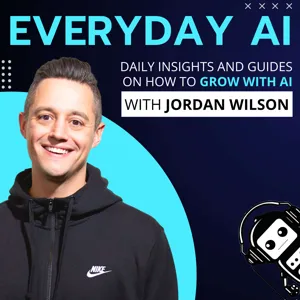Podcast Summary
Creating Intelligent Systems: Reasoning and Coding by Imbue's AI Agents: Imbue's AI agents focus on reasoning and coding, aiming to create autonomous systems that can act on our behalf and accomplish goals, revolutionizing human-technology interaction.
Imbue, a company developing AI agents, is focusing on creating intelligent systems capable of reasoning and coding, rather than just language models. The founders, Kanjian Qiu and Josh Albrecht, share their background and how their interest in agency and AI led them to start the company. They've seen the potential of self-supervised learning in various modalities like video, images, and language, and believe machines might learn representations similar to humans, enabling them to perform tasks autonomously. The ultimate goal is to create agents that can act on our behalf and accomplish goals, freeing us up to focus on our interests. However, current computers require micromanagement, acting more like factory machines than autonomous systems. The promise of AI lies in creating agents that can make decisions and take actions independently, revolutionizing the way we interact with technology.
The Future of Autonomous AI Agents: Despite current limitations, autonomous AI agents are inevitable and already in development. Improving reasoning capabilities and reliability is crucial to make them more trustworthy and capable of handling a wider range of tasks.
We are on the cusp of a future where AI agents can understand and execute tasks autonomously, much like how the first calculator evolved into advanced computers we use today. However, we are not there yet, and there are several challenges to overcome. The speaker identifies three categories of technologies: those that will never work, those that can work with some engineering, and those that are inevitable and already in development. AI agents fall into this last category, but they currently have limitations. They can perform specific tasks, such as conversational bots, but they lack generalization and autonomy. The reliability of these agents is a significant issue, and improving reasoning capabilities is a key focus to make them more trustworthy. As technology advances, we can expect to see more general and autonomous agents that can handle a wider range of tasks. However, overcoming the current reliability challenges is crucial for this progress.
Balancing reasoning, error correction, and cost optimization in language models: Improving reliability in language models involves a balance between reasoning abilities, error correction techniques, and cost optimization. Agents can help specialize models for specific tasks.
Improving reliability in language models involves a combination of reasoning abilities and error correction techniques. The speaker emphasizes the importance of reasoning in making decisions between different action plans and the role of error correction in addressing mistakes. He also discusses the trade-off between cost optimization and generalizability in language models, suggesting that more general models may be more expensive but also more capable of specializing in specific tasks. The speaker also introduces the concept of using agents, like code, to specialize general models and make them more efficient. He concludes by mentioning the historical parallel of the personal computer revolution and the development of both supercomputers and minimal viable models. In summary, the key takeaway is that improving reliability in language models requires a balance between reasoning, error correction, and cost optimization, with the potential for agents to help specialize models for specific tasks.
Exploring limitations of current language models for AI agents: Researchers are investigating higher-level systems for AI agents to overcome limitations of current language models, focusing on code and reasoning processes.
While making more powerful computers was initially the focus, the market for personal computers turned out to be much larger. Similarly, there are limitations to what can be achieved with current language models for AI agents. These models excel at predicting the next word or creating simple classifiers, but they cannot learn complex algorithms or make decisions based on uncertain information. To address these limitations, researchers are exploring higher-level systems that can decide what is the right next step to take and when to collect more information. This includes focusing on code as a medium for creating reasoning agents, as it allows for more specialized and rule-based reasoning. However, this is not a binary choice between code and language, but rather a spectrum. The focus is on understanding the higher-level reasoning processes and creating agents that can effectively navigate uncertain situations.
Fusing language models and code for AI agents: Research focuses on small, frequent tasks to improve AI agent reliability, from simple automation to specific error checking, aiming for incremental improvements
Building and implementing AI agents involves a fusion of language models and code. This fusion allows for decision-making based on both intuitive, nebulous reasoning and structured, coded logic. The research effort begins with identifying tasks for serious use, focusing on smaller, more frequent, and generally applicable tasks that can help improve reliability and push forward new techniques. These tasks can range from simple, general automation to specific, time-consuming tasks like checking pull requests for type errors. The goal is to incrementally improve the reliability of the agent loop, making it a valuable tool for everyday use.
Balancing specialized and general coding agents: To create effective coding agents, evaluate both quantitative factors like code style and variable names, and qualitative factors like trustworthiness and test results.
The development of coding agents involves finding the right balance between specialized and general agents. These agents can call upon each other to solve specific tasks, creating a more capable system as a whole. Evaluation is a crucial aspect of this process, and it involves considering both quantitative and qualitative factors. For quantitative evaluation, we measure things like code style, variable names, and the amount of code generated. For qualitative evaluation, we consider factors like trustworthiness, test results, and the overall feel of the code. The evaluation process involves asking questions about the output and evaluating both the output and the answers to these questions. The goal is to create coding agents that can provide accurate, efficient, and trustworthy solutions to coding tasks. The evaluation process is ongoing, with a focus on making objective measurements wherever possible and gradually incorporating more qualitative assessments as the system becomes more advanced.
Evaluating AI development tools and the importance of clear objectives: Clear objectives and a reliable evaluation loop are crucial for assessing AI development tools. While math and code reasoning can be evaluated easily, relying solely on correct outputs can lead to lost information. Product companies aim to develop tools and frameworks to make agent building more accessible and efficient.
The field of reasoning and evaluation in AI, particularly in non-code tasks, holds great potential for scalability and productivity. The speakers discuss their experiences evaluating AI development tools and the importance of having a clear and objective evaluation loop. They emphasize that while math and code reasoning are easier to evaluate, relying solely on correct outputs can result in lost information. The speakers also share their perspective as a product company, acknowledging the current challenges in producing reliable, production-ready agents, and their goal to develop tools and frameworks to make agent building more accessible and efficient. They are excited about the potential of tools at different levels of the AI stack, and what people will build in the next year and five years, as the technology advances and becomes more ergonomic.
Future of personalized agents: In the next five years, we'll have more robust systems for creating personalized agents using natural language programming, making everyone potential software engineers.
We're on the brink of a future where individuals will be able to create personalized agents to automate various tasks using natural language programming. This was a key theme in a recent discussion, where it was suggested that in five years, we'll have more robust systems that allow us to specify unique workflows and interact with our computers in a more intuitive way. This vision of the future positions everyone as potential software engineers, as we'll all need the tools to create these agents. A significant portion of a recent $200 million fundraise for this company is expected to go towards compute resources, as their primary goal is to make this technology a reality. Companies in this space should consider how they allocate their capital, with a focus on making their products work effectively, rather than growing into large organizations.
Advanced infrastructure crucial for AI progress: With extensive use of compute, a small team can achieve impressive AI results. Infrastructure should be 'agentic' for automation and optimization, and under 5,000 GPUs, it's challenging to compete on state-of-the-art reasoning. Efficiency gains are being made in training, and the focus is shifting towards better data utilization.
Leveraging advanced infrastructure and computational resources is crucial for making significant progress in AI research, particularly in training large models and optimizing performance. The speaker emphasizes that with a relatively small team, they're able to achieve impressive results due to their extensive use of compute. They mention the importance of infrastructure being "agentic," allowing for automation and optimization of tasks, which frees up researchers to focus on other aspects of the project. The belief is that under 5,000 GPUs, it's challenging to compete on state-of-the-art reasoning. However, they note that efficiency gains are being made in training, and the focus is shifting towards better utilization of data for improved performance. The speaker also touches on the importance of coding in AI research, as it's a part of reasoning and helps accelerate both human and agent progress.
AI tools like coding agents are revolutionizing software development: AI tools like coding agents automate tasks, allow for faster development, and improve code quality, enabling companies to gain a competitive edge.
The development of AI tools, such as coding agents, is leading to incremental improvements in workflows and the ability to write more and better software. This technology has the potential to automate tasks like scheduling, unit testing, and even writing code, freeing up resources and allowing for faster development. The use of coding agents also opens up the possibility for regular people to write software without having to code themselves, leading to a future where software is dramatically underwritten and of higher quality. Additionally, these agents can help improve existing codebases by identifying and fixing errors, adding new unit tests, and looking for security flaws. Overall, the development of coding agents represents a significant shift in the software development landscape, enabling companies to write more code than their competitors and improving the overall quality of software.
Custom interfaces and APIs improve user experience: Individuals and small companies can create personalized ways to interact with software using custom interfaces and APIs, leading to improved user experience and the creation of more efficient and enjoyable computer interactions.
With the advancement of technology and the availability of tools like custom interfaces and APIs, individuals and even small companies can create personalized and efficient ways to interact with software, leading to improved user experience. This was exemplified in the discussion where a user created a custom interface for interacting with MidJourney using an API. This innovation not only makes our computers feel nicer to use but also opens up possibilities for more custom software and higher quality products for everyone. As technology continues to evolve, we can expect more individuals and small companies to make significant impacts on the world through the creation and implementation of custom software solutions. So, if you're looking to make your computer interactions more efficient and enjoyable, keep an eye out for these developments and don't hesitate to explore the possibilities offered by custom interfaces and APIs.




